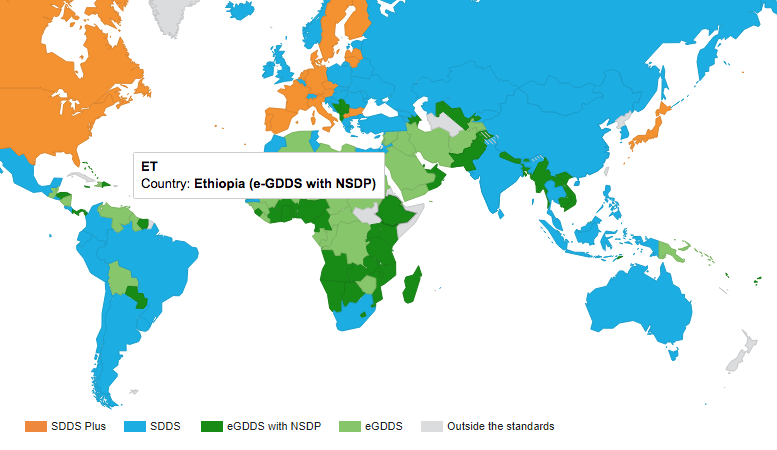
Aug 3 , 2019
By KALAEB GIRMA ( FORTUNE STAFF WRITER )
 Data related to national accounts, government operations, debt, the monetary and financial sector and the balance of payments will be published on the National Summary Data Page (NSDP).
Data related to national accounts, government operations, debt, the monetary and financial sector and the balance of payments will be published on the National Summary Data Page (NSDP). The government has begun publishing data on macroeconomics through a data portal under the International Monetary Fund (IMF) website. The system aims to provide a one-stop publication for essential data.
Data related to national accounts, government operations, debt, the monetary and financial sector and the balance of payments will be published on the National Summary Data Page (NSDP).
The publication will provide policymakers, domestic and international stakeholders, as well as the private sector, easy access to timely information critical for monitoring economic conditions and policies.
The country's GDP, consumer price index, central government operations and gross debt, depository corporations’ survey, central bank survey, interest rates, the balance of payments, official reserve assets, merchandise trade exchange rates and population status will be available on the portal.
Once the data and the information are posted on the page, official data producers from the National Bank of Ethiopia, the Ministry of Finance, the National Planning & Development Commission and the Central Statistical Agency (CSA) will continuously feed data into the portal. Biratu Yigezu, director-general of CSA, will coordinate the system.
The publication comes after the government of Ethiopia adopted the recommendations of the IMF’s Enhanced General Data Dissemination System (e-GDDS) for the release of critical data, according to a statement from the IMF.
The e-GDDS was established in May 2015 to support improved data transparency, encourage statistical development and help create synergies between data dissemination and policymaking.
The IMF forwarded specific recommendations for each type of data to be disseminated by the government offices that included which data should be published, what kind of information they should include, in what way they are to be presented, as well as the time frame to which the suggestions were to be met.
In light of these suggestions, the government adopted the publication of the data in the recommended format on its already existing open data platform.
It took two years for CSA to evaluate and comply with the recommendation, according to said Safi Gemeda, communications director at the Agency.
"During the assessment, we checked what possible ways the recommendations could benefit us," said Safi. "We also examined it against our existing frameworks and institutional capacity."
Ethiopia also has Ethiopia Open Portal, which was created with the support of another continental organisation, the African Development Bank. This portal is part of the open data for Africa project created by the National Bureau of Economic Research (NBER) as a way to systematise public-use data on Sub-Saharan Africa. The portal, in addition to having Ethiopian data, includes data from 47 African countries.
On top of being published on the existing portal, the macroeconomic data of the country will be accessible on the IMF’s Dissemination Standards Bulletin Board. Through the Bulletin Board site, Ethiopian users can access data, browse links to online datasets from other countries, which also enables automatic exchange and sharing of statistical data and metadata between countries.
Alemayehu Geda (Prof.), a university lecturer and a macroeconomist, said the problem in the country is not getting macroeconomics data from the institutions but rather getting credible information.
"There must be a possibility for a peer review by other independent professionals, such as the Ethiopian Economists' Association, or academics to challenge and assess the data," said Alemayehu.
PUBLISHED ON
Aug 03,2019 [ VOL
20 , NO
1005]

Radar | Oct 01,2022

Radar | Jul 21,2024

Fortune News | Sep 06,2020

Fortune News | Aug 13,2022

Viewpoints | Jun 18,2022

Radar | Aug 08,2020

Viewpoints | Jan 27,2024

Commentaries | Jan 04,2020

Covid-19 | Apr 08,2020

Viewpoints | Nov 09,2024

Dec 22 , 2024 . By TIZITA SHEWAFERAW
Charged with transforming colossal state-owned enterprises into modern and competitiv...

Aug 18 , 2024 . By AKSAH ITALO
Although predictable Yonas Zerihun's job in the ride-hailing service is not immune to...

Jul 28 , 2024 . By TIZITA SHEWAFERAW
Unhabitual, perhaps too many, Samuel Gebreyohannes, 38, used to occasionally enjoy a couple of beers at breakfast. However, he recently swit...

Jul 13 , 2024 . By AKSAH ITALO
Investors who rely on tractors, trucks, and field vehicles for commuting, transporting commodities, and f...

Oct 25 , 2025
The regulatory machinery is on overdrive. In only two years, no fewer than 35 new pro...

Oct 18 , 2025
The political establishment, notably the ruling party and its top brass, has become p...

Oct 11 , 2025
Ladislas Farago, a roving Associated Press (AP) correspondent, arrived in Ethiopia in...

Oct 4 , 2025
Eyob Tekalegn (PhD) had been in the Governor's chair for only weeks when, on Septembe...